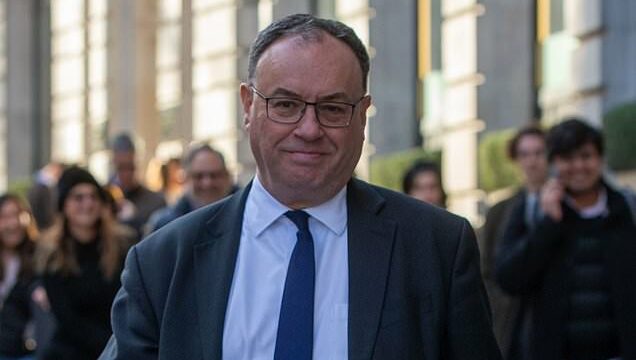Cost of living squeeze will start to ease within WEEKS thanks to a ‘sharp fall in inflation’, predicts Bank of England governor – as PM Rishi Sunak vows consumers will ‘feel a lot better by the end of the year’
- Other forecasters are also said to have painted a positive picture of the economy
- Read more: Cost of living crisis fuelling ‘second major health emergency’
The cost of living squeeze should start to ease within weeks, the Bank of England governor predicted last night.
Household finances are being crushed by a prolonged spiral of price rises with latest figures showing inflation still stubbornly above 10 per cent.
Rishi Sunak said yesterday his plan was to win the fight against inflation – ‘the thing that’s making people feel poor’ – and consumers would ‘feel a lot better by the end of the year’.
He was backed by Andrew Bailey, who in a major speech, predicted better times ahead. Other forecasters also painted a positive picture of the economy.
‘We expect to see a sharp fall in inflation during the course of this year, starting probably in a couple of months or so from now,’ the Bank governor told the London School of Economics last night.
Upbeat: The Bank of England governor Andrew Bailey yesterday
On a visit to Essex, Mr Sunak said: ‘We’ve got a plan – trust me, the plan will work. We have got to stick with it, it’s not easy, it’s never easy to weed inflation out of the system.
‘The plan we’ve got is the right one. Hopefully you will see that in your bank accounts, you will feel a lot better by the end of the year.’
The Bank has been striving to bring prices under control through a steep series of interest rate hikes, creating more pain for borrowers.
READ MORE: Plunge in stay-at-home carers amid cost-of-living crisis
Economic forecasters from S&P Global as well as Barclays yesterday also signalled light at the end of the tunnel with interest rates expected to fall below 3 per cent next year. The S&P Global report suggested that the Bank’s latest hike, to 4.25 per cent last week, may have been the last for the time being and that rates will come down to 2.5 per cent by 2025.
Mr Bailey said latest evidence pointed to ‘more resilient activity’ in the economy and jobs market.
There was a setback last week when inflation unexpectedly rose to 10.4 per cent – showing that its path ‘will not be entirely smooth’ and that pressures on prices ‘remain elevated’, he said.
The Bank is also concerned about growing numbers of workers opting for early retirement – adding to the level of ‘economically inactive’ people.
Mr Bailey said the phenomenon was ‘part of the reason’ why it has had to hike interest rates as much as it has. He described what would happen if workers who retired early built up enough savings to keep spending at the same level as before they stopped working.
That would mean demand in the economy staying the same even as the supply of labour falls – upsetting the delicate balance between supply and demand in the economy needed to keep inflation in check.
‘We should expect this to put upward pressure on inflation in a way that would call for a higher level of interest rates to dampen demand,’ he said.
Source: Read Full Article


